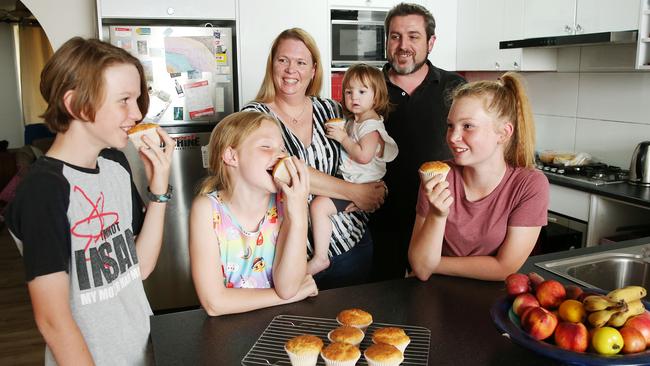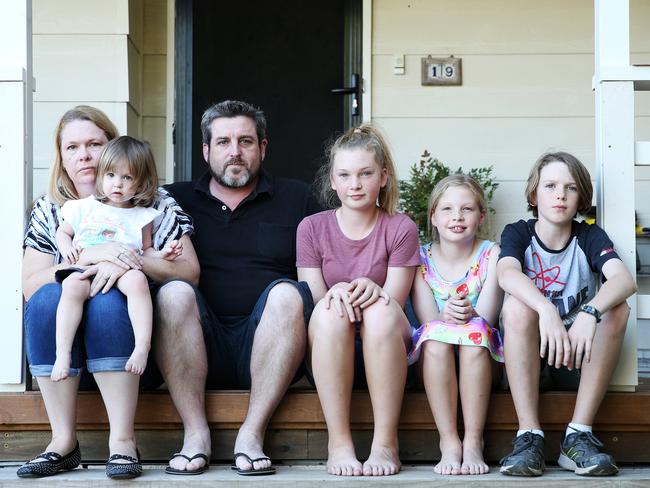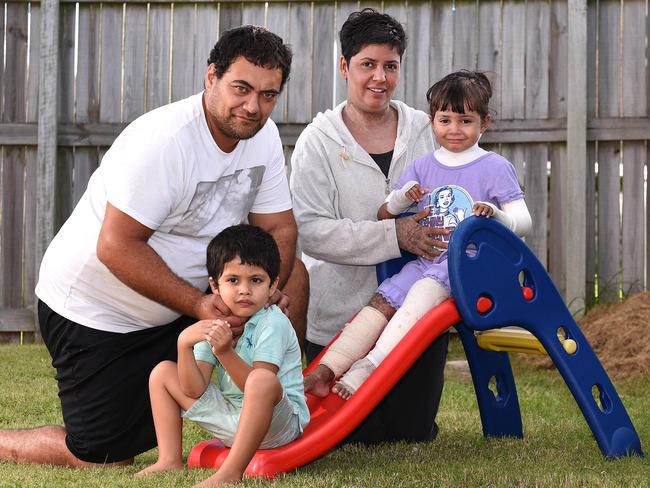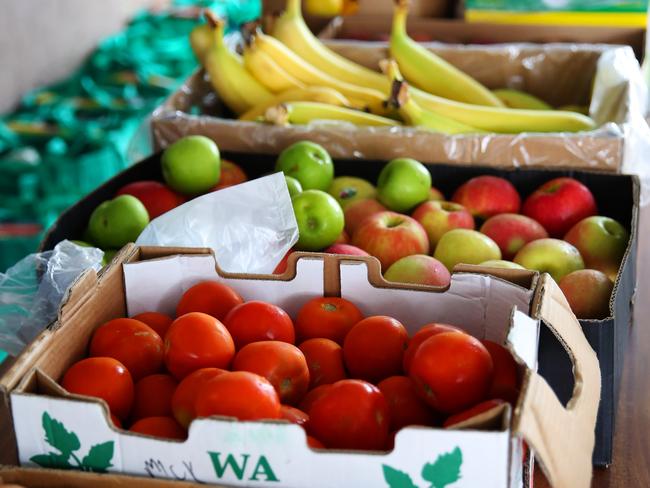One in five Australian kids going hungry as cost of living continues to rise, study reveals
IMAGINE having just $50 a week to feed your family. That’s the reality the Tekani family and many other Australians are living with right now, as they struggle to feed their kids.

Costs
Don't miss out on the headlines from Costs. Followed categories will be added to My News.
EXCLUSIVE
SKYROCKETING cost of living pressures are leaving middle class Australians struggling to feed their children.
An alarming one in five Australian children have gone hungry and have missed out on meals in the last 12-months because of the dire financial situation their parents are in, according to a new report.
And of those, one in three are going hungry every month, one in five are going a whole day without fresh fruit and vegetables once a week, and one in 10 are eating nothing all day at least once a week.

News Corp Australia can reveal Foodbank Australia’s first ever study into food insecurity faced by Australian children.
Brianna Casey, CEO of Foodbank, said the report was “frightening” and should serve as a call to action for the community.
“For far too long we have made the assumption that hungry children are living in other countries, but it is happening right here and we owe it to our children to do better,” Ms Casey said.
“This situation is occurring in every day households. It is a hidden crisis and families are actually having to choose between paying rent, electricity or school fees and feeding their kids.”
Ms Casey said parents were often shamed into silence and said the issue must come out of the shadows so families can be open about asking for help.
Foodbank Australia is the largest provider of food relief in the country and says the demand for its services has increased by 10 per cent in the past year.
RELATED: Families paying more than their mortgage on childcare
The organisation confidentially surveyed more than a thousand Australian parents with children under the age of 15 in 2017 for its Rumbling Tummies report.
The report found that children are now more likely to face food insecurity than adults in Australia — 22 per cent of children vs. 15 per cent of adults.
An unexpected bill or expense (52 per cent) and house payments (38 per cent) were two of the most prominent causes of food insecurity and more than half of parents in food insecure (a lack of food) households (51 per cent) expect it to become more challenging as the cost of living continues to rise.

Almost nine out of 10 parents in food insecure households (87 per cent) have skipped a meal so their children can eat and for 36 per cent, this is a weekly occurrence.
Dennis Yarrington, president of the Australian Primary Principals Association, said teachers and principals were noticing more children arriving at school without food — particularly when it got to the end of the pay fortnight.
“And we can’t assume this only happens in low socio economic communities because it’s not,” Mr Yarrington said.
“It is a sensitive issue that we have to work carefully with parents on because often when they are unable to provide food for their kids they see it as a reflection of their parenting skills when the reality is the factors that have led to their situation often are out of their control.”
Mr Yarrington said some schools had brought forward their longer “lunch break” to 10.30/11am and established emergency lunch provisions in canteens in order to ensure kids who come to school hungry get fed earlier.
“In the last 3-5 years there has been an increase and it is concerning.”
Australian Medical Association president Michael Gannon said he was “gobsmacked” by the figures.
“This is deeply disturbing and deeply shocking ... I would absolutely have been guilty of underestimating the scale of the problem before this report,” Dr Gannon said.
“It’s not only concerning about kids skipping meals but also that the quality of their nutrition is so poor. We know that our obesity crisis is driven by the fact that nutrient poor high fat, high sugar foods are unfortunately cheaper and more accessible.
“We need a whole of society approach to this.”
Nicole Lessio, acting executive director of The Parenthood, said the situation was “unacceptable”.
“The data out of Foodbank is a reminder that hunger isn’t just a third-world problem. It is happening right here in our backyard and on our watch. With cost of living rising and wages stagnating, it’s clear that something has to give. Unfortunately, that’s unfixed costs like food,” she said.
“In a rich nation like Australia, that is completely unacceptable.”

CHOOSING BETWEEN BILLS AND FOOD
SOME days Renee Pettifer, 40, just can’t cope.
The mum-of-four from Hill Top breaks down as she recounts the times her children have had to go hungry because the family simply cannot afford food.
Just last week Emily, 14, Nicolaas, 11, Zoe, 10 and Stephanie, 1 had to skip breakfast because the cupboards were bare.
“It makes me feel like the worst mother on the planet,” Mrs Pettifer said.
“I’m an educated woman and I can’t provide for my children. I never thought it would be this hard.”
Mrs Pettifer works two jobs as a social educator in the disability sector and casually as a learning support officer for children with special needs.
She regularly puts her hand up for extra shifts so the family can make ends meet.
Husband Grant, 40, is a tow truck driver but suffered an accident at work in February and has been unable to return to work since.
They are living off just $1500 a fortnight and their mortgage alone takes up $1000 of that cost.
“After bills and other costs there’s really not much left for food,” Mrs Pettifer told the Sunday Telegraph.
“It is a struggle and sometimes it is a case of do I pay bills or do I buy food.”
Mrs Pettifer said there needed to be more support for families struggling with the rising cost of living.
The Pettifer’s have been receiving assistance from Foodbank but still struggle. She said parents should not suffer in silence and the stigma around asking for help needed to dissipate.
“It makes me feel sad to know that other mothers and families are going through this,” she said.
“We live in a country that is financially stable but the reality is people could be struggling to feed their family and they might be living right next door to you.”

LIVING ON $50 A WEEK
IMAGINE having just $50 a week to feed your family of four.
That’s the reality the Tekani family are living in right now.
The Queensland-based family, including mum Sunita, 35, dad Taha, 35 and children Waimoana, 5, and Renata, 3, aren’t always sure if they’ll make ends meet and where their next meal will come from.
Mr Tekani works as a labourer and the family live off just $1700 a fortnight — and that is on a good week.
Little Waimoana has a severe skin condition, which often requires hospitalisation, doctors visits and expensive dressings.
Waimoana is also unable to regulate her own body temperature which requires the family to constantly have the air conditioning or heating on — resulting in hefty electricity bills of around $1000 a quarter.
After rent and bills they are left with just $50 a week to feed the family.
“We have definitely had to compromise with money and there have been times when we haven’t been able to even pay our rent. If you look at our rental history it is one of the worst,” Mrs Tekani said.
“There have also been times where we’ve had no food or I’ve had to feed the kids Weet-bix for breakfast, lunch and dinner because that’s all we had in the house.”
Mrs Tekani said she wasn’t even able to purchase a birthday cake for her birthday this year and it had to be provided by a family member.
“It does really feel like I am disappointing my family. It just makes me really upset.”
The Tekani’s have recently been receiving food support and have said it has made a huge difference.
Mrs Tekani said other families out there suffering should not do so in silence.
“I used to be one of those that was too scared to ask for help, but you just have to because the reality is things aren’t getting any cheaper.”

NO FRUIT AND VEG
SINGLE-mum of three, Julie Koza, had to move back with her parents to make ends meet.
The 38-year-old says without living rent-free there is no way she could afford to pay for food for kids Alanah, 13, Jacob, 14, and Joshua, 16.
She’s just started a new job as a work safety officer at Melbourne Airport and hopes the position will help improve her situation.
Her children have had to sacrifice having fresh fruit and vegetables and eat more simple meals due to the family’s struggle.
Both Julie’s parents are pensioners and also struggle to have the family in their home.
“They’ve been a great support and had I been paying for rent there’s no way I would have afforded food for the kids,” St Albans-based Ms Koza said.
“The biggest sacrifice I would have made is fresh fruit and vegetables — that’s all the healthy stuff but that’s most expensive.”
Ms Koza has been receiving food parcels from Foodbank and said without them her children would have had nothing fresh to put in their school lunches.
“Even things like cucumbers and apples, it meant I could give them more healthy options.”
She said the stigma around food insecurity should be stripped away to give families a fighting chance.
“This is impacting all Australians and people should not have to choose between putting the heater on or feeding their family.”
Originally published as One in five Australian kids going hungry as cost of living continues to rise, study reveals

